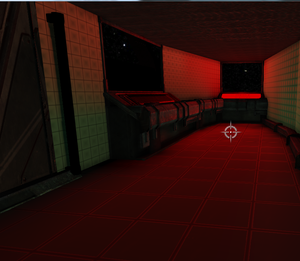Local indie dev preps a pair of wildly different titles
Spokane isn't exactly known as a hotspot for indie game development, but pockets of Washingtonian creativity do exist east of the Cascades. Take, for instance, the Spokesman's own Andrew Smith, who recently introduced himself as a new contributor to the Tech Deck blog. An avid lover of games all his life, Smith has been a part of a multitude of indie development studio start-ups.
Now, he's settled down with his wife, Jackie. Alongside his YouTube Let's Play channel, he's ventured into the realm of totally independent game development. He and his wife have crafted a pair of working game prototypes that he hopes to complete and publish. Over the course of the past week, Andy gave me the chance to play through both of these early working versions. Below are my impressions of each.
The Kingfisher
Andy's first prototype is a project completely his own: a first-person horror title constructed using Unreal Engine 3. The Kingfisher's premise is vague but intriguing. Players take control of a lone astronaut, whose small vessel has docked at an enormous space station bearing the titular name. Unfortunately, the astronaut's ship has broken down, so he's forced to peruse the creepy halls of The Kingfisher for the parts he needs to repair his vessel.

The chunk of the game that's currently available is short but engaging. The title's first-person perspective and sterile, space-age setting call to mind recent prominent horror titles -- think Amnesia: The Dark Descent mixed with Dead Space. Currently, the game is light on interaction and heavy on atmosphere. The Kingfisher sports long, white, dimly-lit hallways that kept me constantly tensed, expecting a jump scare.
The only true activity provided for players at this early stage in development is the act of pressing "E" to turn on lights and activate switches. Despite the lack of traditional "game-y" aspects, Kingfisher kept me hooked during my short time with it. Fungal growth covers the wall of one room, signaling the presence of the mysterious "exurgent virus" that played a part in The Kingfisher's downfall. The lack of any other living presence on-board made me want to discover the specifics of the horrible calamity that led the space station to its current, bleak state.

When the prototype reached its single traditional "scare" moment, I found myself genuinely shaken even though Andy had described it to me ahead of time. Kingfisher's jump-scare strikes that delicate balance between surprise and true scariness. Even though the ghastly apparition that made my heart leap stood in front of me for only a second, its frightening figure kept me thinking about it even after the moment had passed.
Andy says that the finished product will feature innovative mechanics centered on a doing away of conventional "game over" screens, as well as a narrative rooted in the alluring, little-explored idea of transhumanism. The current experience may be brief, but Kingfisher's strong atmosphere and intriguing setting make me confident in the potential of the one-man project.
Love's Destination
The second prototype that Andy showed me is about as different from The Kingfisher as is possible. Development of Love's Destination is spearheaded by Andy's wife, Jackie, who herself is an avid gamer and aspiring developer with the studio moniker "Love Bug." Andy has made large contributions to the project in the form of art assets and code, but on the conceptual and narrative levels, Love's Destination is Jackie's work.

At its core, the game is a dating sim. Players step into the shoes of a college student studying abroad in Nishinomiya, Japan (which happens to be Spokane's sister city), whom you're able to name. The prototype sees players getting acquainted with a handful of unique personalities. Basic conversation choices present themselves, which change up the path of dialogue. For instance, at one point, I was asked about my intended major, and was given the choice to select an answer from a list. At another, a stranger (who's actually an amusing familiar face), asked why I'd been staring at him, and I had to select the most reasonable response.

Though these dialogue choices are surface-level, Love's Destination also promises more consequential decision-making. At one point, a character inquired about my blood type. I was given a list of choices, each accompanied by a detailed personality description. This clever twist helps to shape the player character's personality in a charming, unconventional way, and Andy promised me that, in the finished product, the choice will be one of many to affect how other characters interact with the player over time.
In its current state, most of the game's big decision-making mechanics are missing, and the experience itself is still fairly brief. However, the game's art is pleasant, and it's got a wonderfully kooky, unpredictable personality about it. I was amused by the title's self-aware absurdity; even in its current, bare-bones state, it's a funny, oddball experience, making me think that its yet-to-be-implemented mechanics could very well add up to a solid final product once they're added. ~
